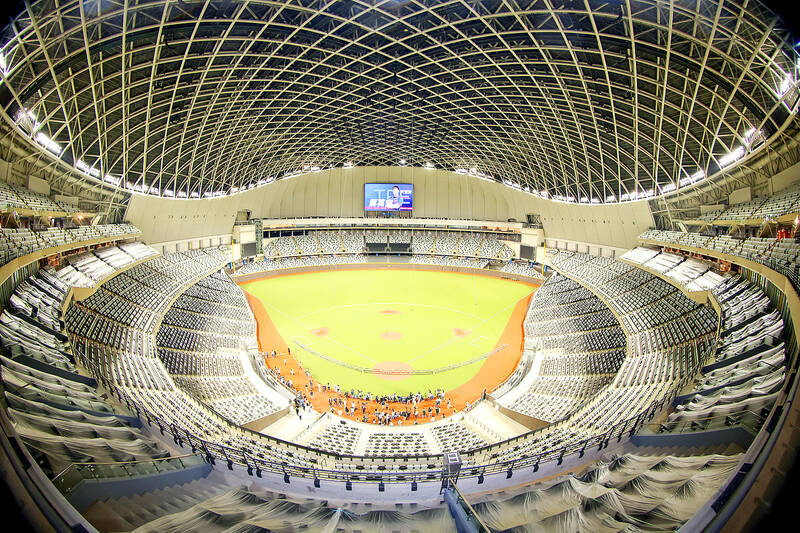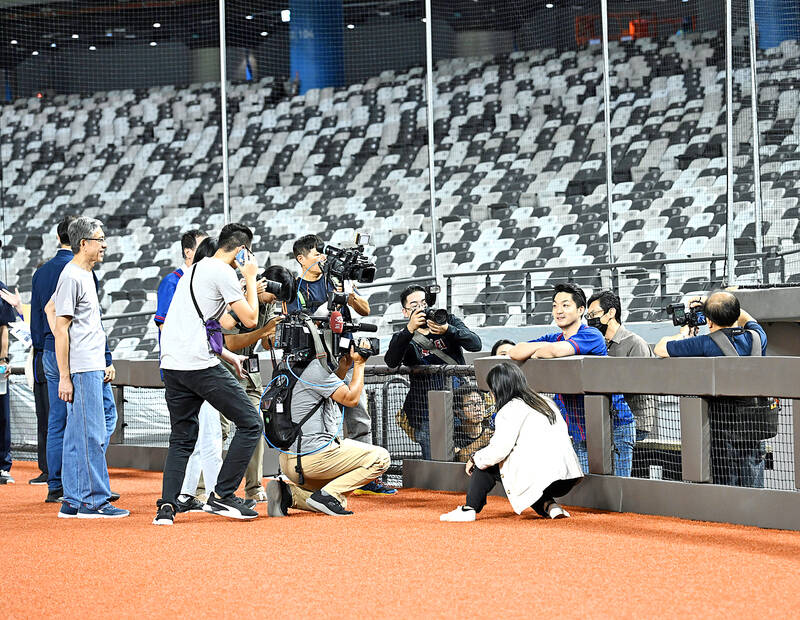The long-awaited Taipei Dome officially opened yesterday, with the indoor professional stadium to hold two trial baseball games next month to test the facility.
Leading a media tour of the domed stadium, Taipei Mayor Chiang Wan-an (蔣萬安) said: “Taipei Dome’s completion is a fulfillment of the public’s demand for a large, top-quality indoor sports stadium.”
“More importantly, it is a wish come true for older Taiwanese baseball fans, who would be able to bring their children here to watch baseball,” he said.

Photo: CNA
“This way they can pass on memories of watching games here to the next generation and together keep a record of happy memories about Taiwanese baseball,” he said.
The dome is to hold two exhibition games for test runs: the first one on Nov. 14, which will not be open to the public, and the second one on Nov. 18, with 12,000 seats open to the public.
Free tickets are available on request from the National Baseball Association, said Yang Shun-chin (楊舜欽), spokesman for the Farglory Group (遠雄集團), the project’s contractor.

Photo: Tien Yu-hua, Taipei Times
The dome’s facility and seating must be ready by the end of next month for the 30th Asian Baseball Championship tournament, with the games being held at the dome and the Taichung Intercontinental Baseball Stadium, Yang said.
Chiang said that US Major League Baseball had sent an expert, Chad Olsen of BrightView Sports Turf, to inspect the facility.
Olsen listed several items that need to be adjusted or improved, including the pitching mound, the batter’s line of sight, the padded fence behind home plate, a safety net to protect fans from foul balls and a net for the foul pole to ensure the safety of players and fans, Chiang said.
Asked whether the issues had been addressed, Yang said Farglory Group’s working team had fixed them.
Yang added that Olsen had conducted 33 tests inside the stadium, mostly on the artificial turf, the infield’s “red dirt,” the pitching mound and the batter’s box, and that all of them have passed a review by the city government.
“We are certain the dome’s facility and other items conform to international standards, although we are still awaiting feedback after the two test games and would make further adjustments as needed,” Yang said.
Chiang said he would speak again to Farglory Group about the white seats, which players and fans have said could make it difficult to see the ball clearly.
One possible solution is to put on colored seat covers, he said.
Construction of the dome took more than a decade, with the project repeatedly delayed or suspended due to changes in design, safety concerns and other major issues.
“The dome’s opening today is what fans have been waiting for, and also a time to remember for Taipei,” Chiang said, adding that it has been more than three decades since local baseball fans first heard of a promise by then-premier Hau Pei-tsun (郝柏村) to build an indoor sports dome in Taipei.
Hau had attended the seventh decisive game of the Taiwan pro baseball championship finals on Nov. 10, 1991. The Uni-President Lions and the Weichuan Dragons were battling it out at the outdoor Taipei Sports Stadium, when a heavy downpour disrupted the game.
“We want an indoor stadium,” the fans chanted at the time, leading to Hau’s promise and laying the seed that came to fruition with the construction of Taipei Dome.

A magnitude 7.0 earthquake struck off Yilan at 11:05pm yesterday, the Central Weather Administration (CWA) said. The epicenter was located at sea, about 32.3km east of Yilan County Hall, at a depth of 72.8km, CWA data showed There were no immediate reports of damage. The intensity of the quake, which gauges the actual effect of a seismic event, measured 4 in Yilan County area on Taiwan’s seven-tier intensity scale, the data showed. It measured 4 in other parts of eastern, northern and central Taiwan as well as Tainan, and 3 in Kaohsiung and Pingtung County, and 2 in Lienchiang and Penghu counties and 1

FOREIGN INTERFERENCE: Beijing would likely intensify public opinion warfare in next year’s local elections to prevent Lai from getting re-elected, the ‘Yomiuri Shimbun’ said Internal documents from a Chinese artificial intelligence (AI) company indicated that China has been using the technology to intervene in foreign elections, including propaganda targeting Taiwan’s local elections next year and presidential elections in 2028, a Japanese newspaper reported yesterday. The Institute of National Security of Vanderbilt University obtained nearly 400 pages of documents from GoLaxy, a company with ties to the Chinese government, and found evidence that it had apparently deployed sophisticated, AI-driven propaganda campaigns in Hong Kong and Taiwan to shape public opinion, the Yomiuri Shimbun reported. GoLaxy provides insights, situation analysis and public opinion-shaping technology by conducting network surveillance

‘POLITICAL GAME’: DPP lawmakers said the motion would not meet the legislative threshold needed, and accused the KMT and the TPP of trivializing the Constitution The Legislative Yuan yesterday approved a motion to initiate impeachment proceedings against President William Lai (賴清德), saying he had undermined Taiwan’s constitutional order and democracy. The motion was approved 61-50 by lawmakers from the main opposition Chinese Nationalist Party (KMT) and the smaller Taiwan People’s Party (TPP), who together hold a legislative majority. Under the motion, a roll call vote for impeachment would be held on May 19 next year, after various hearings are held and Lai is given the chance to defend himself. The move came after Lai on Monday last week did not promulgate an amendment passed by the legislature that

AFTERMATH: The Taipei City Government said it received 39 minor incident reports including gas leaks, water leaks and outages, and a damaged traffic signal A magnitude 7.0 earthquake struck off Taiwan’s northeastern coast late on Saturday, producing only two major aftershocks as of yesterday noon, the Central Weather Administration (CWA) said. The limited aftershocks contrast with last year’s major earthquake in Hualien County, as Saturday’s earthquake occurred at a greater depth in a subduction zone. Saturday’s earthquake struck at 11:05pm, with its hypocenter about 32.3km east of Yilan County Hall, at a depth of 72.8km. Shaking was felt in 17 administrative regions north of Tainan and in eastern Taiwan, reaching intensity level 4 on Taiwan’s seven-tier seismic scale, the CWA said. In Hualien, the